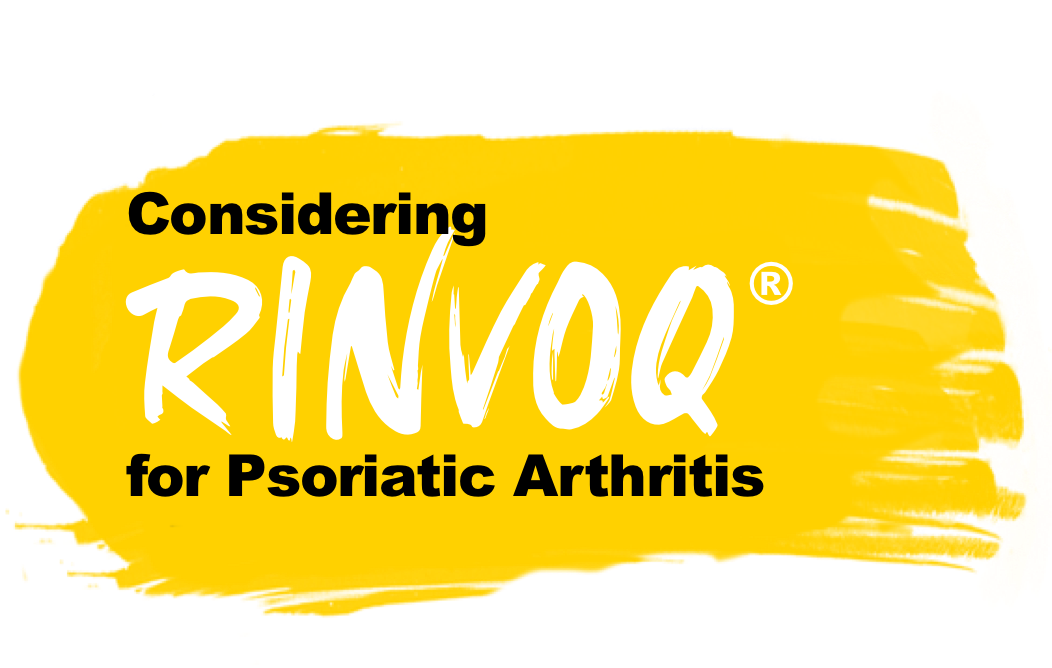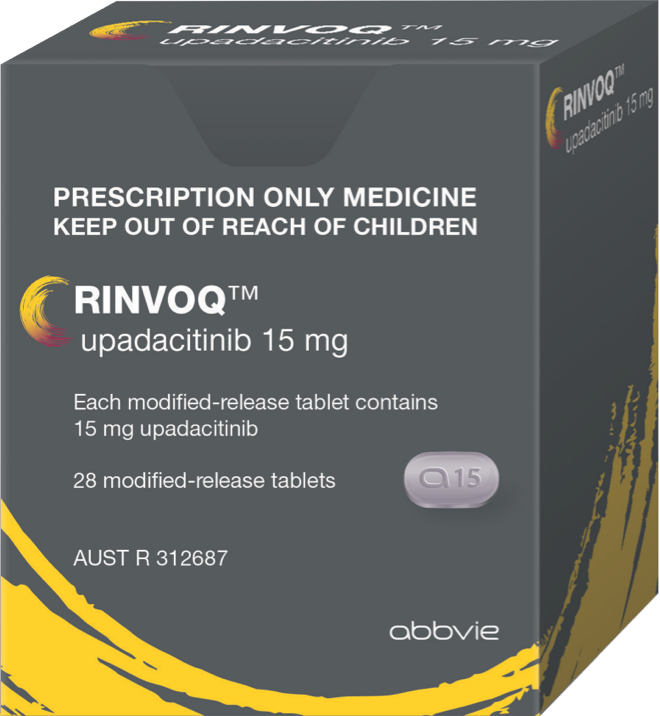
Consider RINVOQ® for Psoriatic Arthritis
If your current psoriatic arthritis treatment isn't adequately relieving your symptoms, RINVOQ® may help.
With just one dose every day RINVOQ® may reduce symptoms of active psoriatic arthritis.1
Ask your doctor if RINVOQ® could be right for you.
RINVOQ® may help reduce joint pain and skin symptoms in adults who are living with moderately to severely active psoriatic arthritis (PsA).1

Managing PsA can sometimes seem like treating two diseases. Some treatments work mainly or only on either skin problems or arthritis. Others work on both.2 Medications for PsA focus on pain relief, reducing swelling, inhibiting joint damage, and treating skin symptoms. They can include:2,3
- Topical medications made from vitamin D, vitamin A derivatives, salicylic acid, coal tar or corticosteroids.
- Disease-modifying anti-rheumatic drugs (DMARDs)
- Pain relief medicines such as paracetamol
- Non-steroidal anti-inflammatories such as ibuprofen
- Biologicals
If you’re on a treatment for PsA but not getting the relief you expect from the joint pain and/or red, scaly skin patches, it could be time to talk to your doctor about another treatment option.
RINVOQ® works by targeting a specific source of inflammation that contributes to joint and skin symptoms.1 It may help relieve pain, reduce swelling, help keep joints working properly and possibly prevent further joint damage, allowing you to perform everyday activities in greater comfort.1
RINVOQ® for PsA in New Zealand
The recommended dose of RINVOQ® for PsA is 15 mg once daily, taken with or without food.1
RINVOQ® is only available with a prescription, so if you are experiencing symptoms of PsA despite your current treatment, consult your rheumatologist to see if RINVOQ® is right for you.
RINVOQ® is not currently subsidised for PsA and you will need to pay the full cost of this medication.
Tackle PsA head on with RINVOQ®
The efficacy and safety of RINVOQ® 15 mg once daily was assessed in two randomised, placebo-controlled clinical trials involving over 1,700 patients aged 18 years or over with moderately to severely active psoriatic arthritis.1,4-8 Collectively, these trials concluded that compared to the placebo groups, a greater percentage of patients who received RINVOQ® experienced the following:
Significant relief of joint pain, swelling, and stiffness symptoms at 3 months.1,4-6*
- For some patients, symptoms improved significantly within the first 2 weeks.1,5,6
- Many patients continued to experience symptomatic relief at 56 weeks.1,7,8
- In one trial, disease progression was halted in 97% of cases, as observed by X-ray at 56 weeks.1,7
Psoriasis symptoms** for people with skin plaques were reduced at Week 16.4
Significant reduction in fatigueΩ at Week 12.4
- In both these measures, improvements were maintained through Week 56.1,7
More patients resolved their enthesitis (swelling and tenderness of ankles and elbows) and dactylitis (sausage finger) at Week 24 compared to patients taking placebo.4,5
*Primary measure to assess joint symptoms was ACR20 at Week 12. The ACR (American College of Rheumatology) score is used to measure the change in arthritis symptoms. Scores of ACR20, ACR50 or ACR70, indicate a 20% (or 50% or 70%) improvement in tender and swollen joint counts and three of five scores of individual elements: Visual Analogue Scale (VAS) scores of patient pain; physician and patient global assessment; a disability measure (Health Assessment Questionnaire (HAQ)) and an acute phase reactant (C-reactive protein (CRP) or erythrocyte sedimentation rate (ESR)).9
**Measured by the Psoriasis Area and Severity Index (PASI). A higher PASI score represents more severe psoriasis.10
ΩFatigue is measured using a score called FACIT-F, with higher scores indicating less fatigue.11
Frequently Asked Questions about RINVOQ®
When should I expect to see and feel an improvement?
Clinical trials (see results above) suggest you may see significant improvement in joint pain, swelling, and stiffness symptoms within 3 months, and possibly rapid improvements sooner than that.1,4-6 However, some patients will not respond within these timeframes.
It's important to be patient and stay on track with your dosing schedule.1
Will the benefits last?
During the clinical trial extension period, ongoing observations suggest that many patients taking RINVOQ® who experienced improvements in their symptoms at 12–16 weeks will continue to see them up to 56 weeks.1,7,8
Will RINVOQ® cure my disease?
Unfortunately, currently there are no treatments available that can cure PsA. RINVOQ® will not cure your condition but can help manage your symptoms.
What else can I do to take care of my disease besides taking medications?
There are several ways to help manage your PsA. Understanding the condition and being fully informed by your healthcare provider is a great start. The Arthritis Foundation website in particular also offers many helpful tips.2
What does this mean for me?
RINVOQ® may help fight the joint pain, swelling, and stiffness experienced in PsA, in a once-daily dose.1,4-8 It may also help fight fatigue.1,4,7
But to see how RINVOQ® could be a part of your treatment plan, you’ll first need to have a discussion with your rheumatologist.